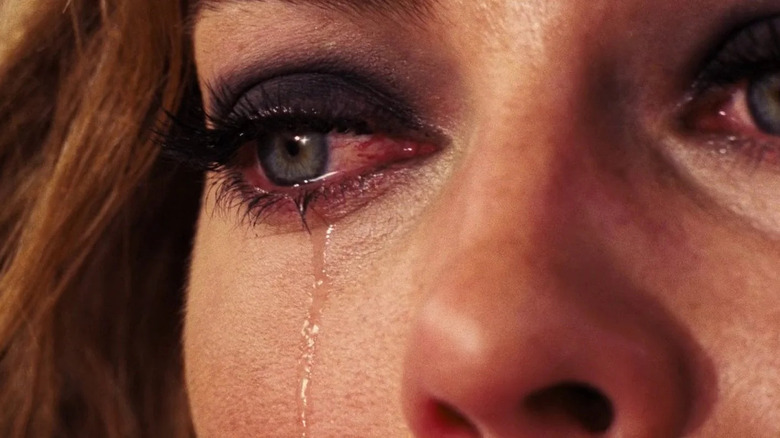Babylon Composer Justin Hurwitz On What His Scores Have In Common With Curb Your Enthusiasm [Exclusive]
The well-known theme song for Larry David's HBO series "Curb Your Enthusiasm" is, in fact, a piece of music composed for a 1974 Italian movie called "La Bellissima Estate" directed by Sergio Martino. The piece in question was entitled "Frolic," and while it was meant to convey a sense of circus-like whimsy in 1974, when used to punctuate the pathetic life of Larry David, the theme takes on an ironic tone of existential dread. Larry David's suffering is but an absurdist quirk of the universe, a universe geared toward annoyance and pettiness.
The closing of Damien Chazelle's 2022 film "Babylon" might be said to possess a similar musical moment. "Babylon" ends with a brilliant, jazzy montage wherein all cinema, from its earliest days through "Avatar," are encapsulated in a head-spinning, jazzy montage of evolving entertainment. It shows highlights from notable cinematic technical achievements, eventually revealing that film is little mire than swirls of emulsion on celluloid. The score, composed by Justin Hurwitz, reveals that all film, no matter how much we try to stage it as a noble art form — and one we have arranged fortunes, lives, and an entire city upon — is but an absurd mixture of chemicals.
In an interview with /Film's own Ben Pearson, Hurwitz talks about the score to "Babylon," and its similarities to "Curb Your Enthusiasm." As he tells it, he moved from writing jokes to writing music, finding his passion along the way. Hurwitz, to point out his resume, had written for "The Simpsons," "The League," and "Curb" prior to writing film scores for Chazelle.
'Totally different parts of your brain'
"Once [Damien Chazelle's] movies — once there was a movie for me to score, that's all I wanted to do because that's what I had studied," Justin Hurwitz explains. He continues:
"I had studied film scoring. It's what I wanted to do. It's, by far, what I'm most passionate about, what I'm better at than writing jokes and stuff. But writing for some sitcoms was definitely a fun and interesting way for me to keep myself busy until I could do music full-time."
Hurwitz also describes a brief moment in 2018 when he was preparing to write music for Chazelle's astronaut film "First Man," when he had to opportunity to write for "Curb Your Enthusiasm" again. He says he turned it down in favor of doing music. The two disciplines, he says, are diametrically opposed, and he needs to be in very different mindsets to work on them. When talking to journalists, Hurwitz seems to get the question a lot. One, he feels, is more creative, while the other draws for a more authentic place of wry cynicism:
"People always ask me, the writing and the music, what are the similarities? And I always say, 'There are none. They're just different sides of your brain. Music is its own thing.' And I'm usually being very earnest and very emotional and serious about it. And then the writing on 'Curb' and all that, it's just whenever something awkward happens in my life or I put my foot in my mouth or something, I have a dark idea, a cynical idea, that's an outlet for it. [...] So I usually say there is no connection. There're just totally different parts of your brain."
After a moment of reflection, though, Hurwitz does notice a particular similarity.
Collision
"Curb Your Enthusiasm," for the unfamiliar, typically involves multiple stories or plot elements, most of them minor, that will seem unrelated, but ultimately wrap together at the end. Sometimes the connection will be random, but will fill a minor comedic — yet cosmic — aperture. In one episode, for instance, Larry David attempts to give a pair of sunglasses to a relative, but is unable to do so. By the end of the episode, he will be kicked out of his home for multiple social infractions, and forced to sleep in his car. Just as the sun is coming up, he remembers the sunglasses, puts them on, and sleeps better.
Justin Hurwitz sees something similar in the way Damien Chazelle writes movies, and how his own music ties all of Chazelle's ideas together:
"I guess there is a structural similarity in the way that 'Curb' is written [...] where the stories would all collide at the end. They would all come together in this very satisfying collision. And I guess we do that, our film scores do that. Everything comes together in the epilogue of 'La La Land.' All of our themes come together in the landing of 'First Man.' All of our themes come together in the finale of 'Babylon.'"
Thematic oneness instead of plot oneness. Hurwitz finally sees it, explaining:
"Very different techniques to how we bring it together in each of those film scores, but everything does collide in the end. And I've never really thought about this, but I suppose the things I've written for in a very different way, narratively with comedy storylines, they all kind of collide. So maybe deep down, there is some kinship between those things."
All film is one, and everything collides. I see it too.


